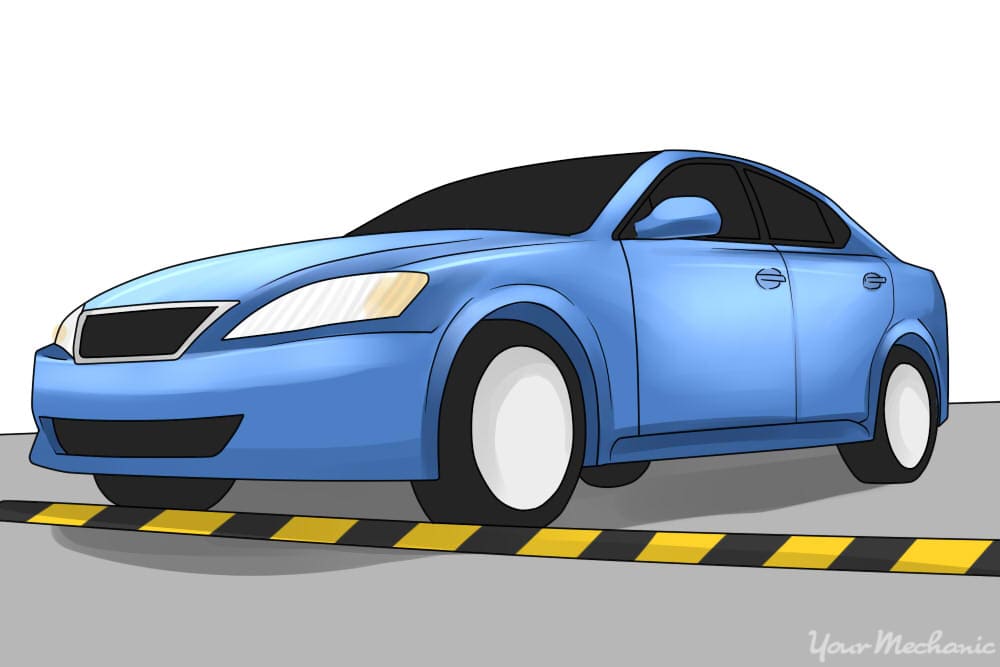If you’re experiencing a clunking noise when braking and going over bumps, it is likely caused by damaged or worn-out control arms. Control arms can wear out, especially in off-road conditions, causing the wheels to move out of alignment and resulting in a clunking noise when steering on bumps.
Another possibility is worn or loose ball joints, which can create a rattling noise when going over bumps. It is important to have these issues checked and repaired as soon as possible, as they can be dangerous and affect the performance of your vehicle.
Common Causes Of Clunking Noise
One common cause of a clunking noise when braking and going over bumps is worn-out control arms. Control arms can wear out even in normal road conditions, but the damage and wear are accelerated if you drive in off-road conditions. Worn-out control arms may cause the wheels to move out of alignment, which in turn causes the vehicle to make a clunking noise as you steer the wheels on a bump.
Another cause of a clunking noise can be damaged or worn-out suspension components. If your shock absorbers or struts are worn, they may no longer perform their function, resulting in the clunking noise. Additionally, worn-out ball joints in the front can rattle each time you hit a bump, creating a dangerous condition that should be checked immediately.
Loose or worn-out bushings can also contribute to the clunking noise. Bushes keep the control arm in position, but they can wear out over time, making the arm loose and causing the clunking to appear when going slow or over bumpy roads.

Credit: m.youtube.com
Diagnosing The Clunking Noise
When it comes to diagnosing a clunking noise when braking and going over bumps, a front-end inspection is essential. Checking ball joints is a crucial step in identifying the source of the noise. Worn or loose ball joints can produce a faint, intermittent clunking noise when going over bumps or corners. It is important to note any symptoms such as more pronounced noise on certain conditions. Additionally, inspecting control arm bushings is also important. Worn-out or damaged control arm bushings can cause the wheels to move out of alignment, resulting in a clunking noise when steering on bumps. It is important to address these issues promptly to ensure the safety and performance of the vehicle.
Fixing The Clunking Noise
When it comes to the clunking noise when braking and going over bumps, fixing the issue involves replacing control arms, repairing suspension components, and replacing bushings. Damaged or worn-out control arms can cause misalignment of the wheels, resulting in the vehicle making a clunking noise when steering on a bump. Control arms can wear out over time, especially in off-road conditions. Additionally, worn-out control arm bushes can make the control arm loose, leading to the clunking noise when driving over bumps or on uneven roads.
Repairing suspension components, such as shock absorbers or struts, is another potential solution for eliminating the clunking noise. Worn or faulty suspension components can fail to perform their function properly, causing the noise to appear when driving over bumps. Additionally, worn-out ball joints can also cause a clunking noise when going over bumps or corners. It is essential to address this issue promptly as loose or worn-out ball joints can be dangerous.
In conclusion, to fix the clunking noise when braking and going over bumps, replacing control arms, repairing suspension components, and replacing worn-out bushings are necessary steps to take. By addressing these issues, you can ensure a smoother and safer driving experience.
.jpeg)
Credit: completecarcare318.com

Credit: www.yourmechanic.com
Frequently Asked Questions On Clunking Noise When Braking And Going Over Bumps
Why Does My Car Clunk When I Brake Or Go Over Bumps?
The clunking noise when braking or going over bumps in your car is likely caused by damaged or worn-out control arms. Control arms can wear out even in normal road conditions, but driving in off-road conditions can accelerate the damage and wear.
Worn-out control arms can cause the wheels to move out of alignment, resulting in a clunking noise when steering on a bump. It’s important to have this checked and repaired to ensure safety.
Why Does My Car Clunk When I Drive Over Bumps?
Most likely, your car clunks when you drive over bumps due to damaged or worn-out control arms. Control arms can wear out, especially if you drive in off-road conditions, causing the wheels to move out of alignment and creating a clunking noise.
This is a potentially dangerous condition and should be checked immediately.
How Do I Know If Clunking Noise Is From Struts Or Tie Rods Or Ball Joints?
If you hear a clunking noise when driving over bumps, it may be due to worn-out control arms or ball joints. These parts can wear out over time, especially if you drive in off-road conditions. It is important to get them checked immediately as it could be a dangerous condition.
Do Ball Joints Clunk Over Bumps?
Yes, ball joints may clunk over bumps, causing a faint intermittent noise when going over a bump or corner. This is a sign of worn or loose ball joints and should be checked immediately.
Conclusion
If you’re experiencing a clunking noise when braking and going over bumps, there are a few potential causes to consider. Worn-out control arms, damaged or worn-out ball joints, and worn-out control arm bushes are common culprits. These issues can cause misalignment of the wheels, resulting in the clunking noise.
It’s important to address these problems promptly, as they can lead to dangerous conditions. If you’re unsure of the exact cause, it’s recommended to have a professional mechanic inspect your vehicle.






